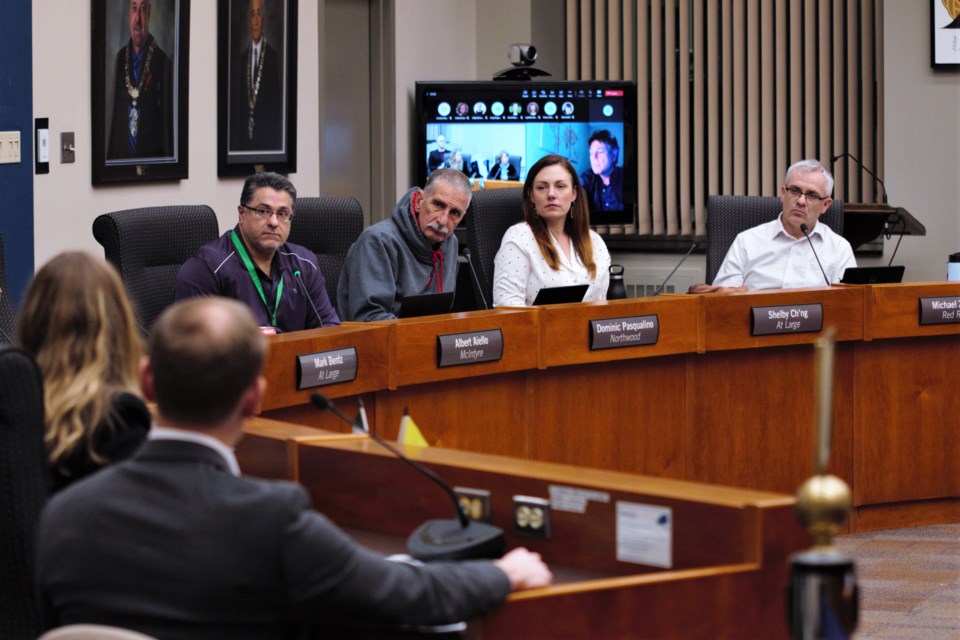THUNDER BAY — City councillors asked some hard questions on spending and staffing increases during the second of four review meetings to set the 2023 budget on Thursday, but offered few hints as to where they could find millions in proposed cuts.
Council has instructed staff to prepare a list of possible cuts in a bid to wrestle the increase to the tax levy down to four per cent, after accounting for growth in the city’s tax base.
Some councillors have already said they likely won’t support the cuts necessary to reach that target, while others — including Mayor Ken Boshcoff — say they'd like to see taxes rise by even less.
But as they reached the rough halfway mark of the budget process Thursday, councillors have given no indication yet that they have any ideas of their own on how to get there.
The only significant change to the budget made by council remained the addition of $1.3 million in capital spending. That will help chip away at an estimated $22 million yearly infrastructure spending shortfall and stave off a planned cut to the public library, but also add to the tax levy.
It’s the main reason the tax levy hike has crept up slightly so far during the review process, currently standing at 6.6 per cent, or six per cent after growth.
That came down 0.2 per cent from Tuesday, after administration pulled $424,000 from the proposed budget to correct what staff described as an error that over-calculated fire department staffing costs.
On Thursday, in a meeting lasting roughly four hours, councillors reviewed large swaths of the budget including community services, fire and EMS, the Thunder Bay Community Economic Development Commission, and the parking authority.
Those areas have largely contained costs in 2023.
Community services, which includes recreation, transit, fleet, and energy management, presented a largely status quo budget, with the department’s net budget shrinking by about $1.6 million from 2022.
Overall spending in the department would rise by just over one per cent, however, thanks in large part to an increase in provincial grants, and the suggested use of $1.2 million in reserves to help cover a steep jump in fuel costs.
Councillors expressed concern over the growing chunk of city spending taken up by emergency services — now around 37 per cent — although only police are seeking a significant increase this year.
Paramedic and fire services each requested increases below two per cent from the city.
Superior North EMS, however, will significantly expand operations in the district thanks to new provincial and federal funding, hiring 11 new full-time staff to expand service hours in Geraldton, Marathon, Shuniah, and Kakabeka.
That was made possible in part by federal funding to recognizing the service’s work with patients from area First Nations, new EMS chief Shane Muir told council.
Both Muir and fire chief Greg Hankkio discussed plans to add contract psychological services in an effort to address mental health challenges they said are taking a growing toll on staff and driving up overtime and WSIB costs.
A request for a seven per cent, or nearly $4 million, jump in city spending on policing — identified by administration as the single largest driver of this year’s tax hike — will be considered in detail by council next week.
On Thursday, the Thunder Bay CEDC moved to lower its budget request by around $50,000, with CEO Jamie Taylor telling councillors “we recognize the pressure you are under” to contain the tax increase.
The arms-length municipal agency is still seeking an increase of around $175,000 from last year, however, to fund a staffing expansion Taylor said would bring economic development benefits.
The proposed expansion would add a marketing coordinator and a project coordinator to support the Entrepreneur Centre’s starter and summer company grant program, which was previously funded through the NOHFC.
It was one of several areas of the budget that drew sharp questions from council.
“It seems like there’s a lot of people there that this job could be quite easily done by the existing complement,” said Boshcoff, referring to the CEDC’s 17 staff.
“I’m going to have to disagree,” Taylor responded, saying the CEDC needs additional capacity to properly market the city to tourists and potential investors, and can save by doing more marketing work in-house.
Coun. Brian Hamilton said the city needs to be competitive on those fronts, but also pressed Taylor to justify the increase.
“Every position we’re hiring in this budget, I hope you understand, is going to be highly scrutinized,” he said.
The parking authority proposed a status quo budget, with slight increases to parkade rates and surface lots, but demand is anticipated to remain lower than before the pandemic.
Coun. Michael Zussino said the city should consider selling off some less well-used parking assets, calling the 3,400 parking spots the city maintains “a staggering number.”
“If those lots are underutilized, let’s sell them, let’s build some housing on them,” he said.
Council will meet again on Wednesday, Jan. 25 for a third review meeting. That night’s agenda will include a close look at areas including policing, the public library, Victoriaville, the city manager’s office, and more.
Learn more about the city’s budget process, and how to get involved.
